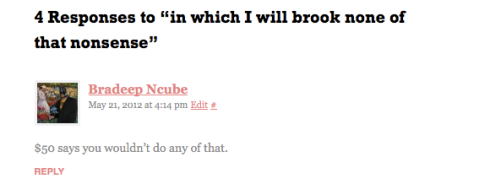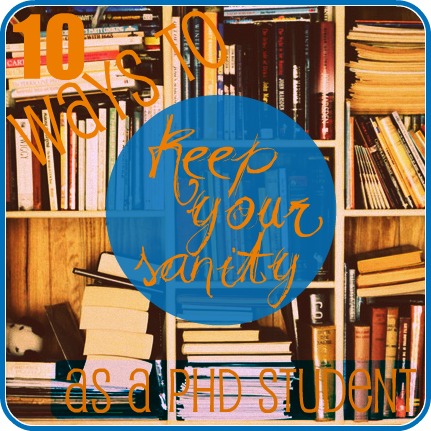So because it’s a snow day today (!!!) and we already had the day off (which is low on the list of reasons we should all be thanking the memory of Martin Luther King, Jr., and all of those who worked towards his dreams), I decided it was finally time to tell you all the epic story of my time attending and presenting at the MLA Annual Convention.
Every year, the Modern Language Association — which is the governing organization for all Modern Language professionals and which does so much more than determine how you should cite sources in your English classes — holds a convention during which hundreds of people give talks on hundreds of panels, hundreds of job interviews are held, and one major metropol is pretty much taken over by nerds. It’s kind of a big deal. And by “big deal” I mean “extraordinarily overwhelming, expensive, and exhausting event wherein every few minutes your emotions will ricochet from boredom to terror to insight to fascination to pure delight.”
This year, the convention was held in Seattle and, by a stroke of dumb luck that I still haven’t quite sorted out (sidebar: almost published this with the phrase “dumb lick” instead of “dumb luck,” which I think would imply an altogether different sort of convention), I got a talk accepted to a panel and thus was off to the MLA to try not to embarrass myself too much. So here’s my recounting of how it went, what it was like, and what you might expect if you go to or present at the MLA convention or another major academic convention.
What presenting at and attending the MLA Annual Convention was like:
1. I arrived in Seattle the evening of the conference’s first day because I was slated to present in the morning off the second day. This means I missed a whole day of presentations; I am totally okay with that. It takes a lot out of this body to sit all day, in a suit, listening to people talk, especially after a 6 hour train ride. I also left a day early because I needed to get back home in time for the term to start, so I missed about half of the convention. I think that was a good thing.
2. The build up to my presentation, to my surprise, was not as laden with panic as I had expected it to be. I attribute this to two things: the first is that I worked damn hard on that talk and was pretty damn pleased with what I was saying and how I was saying it. I thought about the ideas for about 10 months. I spent three weeks writing the presentation. I rehearsed it on my own and with a friend. It felt good. But the second reason I wasn’t too panicked is because I watched a panel present before me. Now, here’s probably the most unkind thing I’ve ever said on this blog: some people are not very interesting, and one of those people was a presenter on the panel before mine. This isn’t to say that she wasn’t smart or that her work wasn’t worthwhile, it’s just that she wasn’t a good performer. Academia is all about thinking thoughts and writing them down, so not a lot of people get trained to perform those thoughts the way you have to in a presentation setting (see more on this below, in my advice section). Because I spent my youth in the theater, I have tons of training as a performer and so I knew that, no matter how good or bad my ideas were, I would be able to perform those ideas well. This was, needless to say, a huge relief.
3. The MLA panel presentation itself was a blast. Seriously, it was so much fun! A panel usually consists of 3-4 speaks, possibly with a respondent who will begin the Q&A style conversation after the panelists have delivered their papers. My panel was made up of just three of us, organized by the loose topic of Pacific Northwest Folklore. The first two papers had to do with car cultures in the NW; my paper was a literary exploration of two fictive representations of the Pacific Northwest in a postapocalyptic setting. So I knew that my paper was going to be a little more… flashy than the other two. Oh well. But since I was last on the list, I got to just sit and listen while the first two papers were given — and I learned a whole bunch of cool new things! Then, I got to present. The other two members of my panel had delivered their papers from the table, but I like to stand and move, so I got up and went to the podium. Then, just as I had rehearsed it, I gave my talk. Afterwards, I sat down and answered the questions sent my way. It was a blast. I think what made the experience the most rewarding for me was that I treated the Q&A like an interesting conversation, not like a chance to show everyone how much smarter than them I am (because, you know, I’m not). So my Q&A was like a friendly chat, except that I’m an expert on this stuff and no one else there was. Fun!
4. After I presented, I just got to attend all the panels I wanted to hear. I chose based solely on how interesting the papers sounded, not on how many hoity-toities I thought would be in attendance with me. I think this was a good idea. Moreover, I decided that, while I would have business cards at the ready and would contribute to the conversations if I had something meaningful, I would not jockey for position or insert myself into conversations simply to promote myself. Not only am I early enough in my career than it’s not really all that useful or necessary for me to sell myself in that way, but I also think that it can do more harm than good to seem like you’re desperate for status. Maybe this means that I get slightly less notice than others, but I think it means that the notice I get is all positive.
5. In the evening, I went out with friends for drinks and dinner. It was a great idea.
My takeaway impressions and slivers of advice for MLA Annual Convention attendees and presenters:
1. Don’t worry about it. Yep, everyone there is smart. Yep, someone there is way smarter and way more famous or influential than you. But everyone who is there deserves to be there just exactly as much as you do, so relax a little. It’s just one big homecoming dance for a lot of folks, so if you relax and just have a good time, then you’ll come off a lot more interesting and impressive than the other people who seem like they’re constantly intriguing to be the Homecoming Queen or whatever.

2. If you’re presenting, for the love of comfortable shoes, MAKE EYE CONTACT occasionally. There were a number of panels that I sat through where my notes mostly consisted of doodles and the following note, written in my swirliest handwriting: “is it just me, or is this the worst?” There are brilliant people saying brilliant things on pretty much every panel. But no matter how brilliant, if the process of listening to those things is akin to watching to CSPAN while the Senate’s in recess, then no one is going to be interested in or attentive to those brilliant things. Delivering a paper at a conference is NOT the same as writing a paper for publication, because listening to a paper at a conference is not the same as reading one. As sad as it may be to admit this, papers delivered by lively, engaging speakers who look at the audience, throw in a joke or two, appear confident, and treat the process like the start of a really good conversation will be more successful and useful than even the most astute, most astounding paper delivered in a monotone, while the speakers stares down at his or her notes, without emotion.
3. If you’re presenting, stay within the time limit! Not only is it, you know, common courtesy, but it’s also, I think, indicative of a real intelligence. The best and most impressive speakers I saw were those who appeared to actually treat their presentation as a chance to think through their work in a new and specific way. If I know that I have only fifteen minutes to present this whole slew of ideas, then I’m going to be selective and careful and creative in how I fit it all together, which is not only more interesting to listen to, but shows that I really understand my project in a profound way. This is how you want to impress people.
4. If you’re asking questions, make them real questions and not just opportunities to tell everyone else how smart you are and how amazing you would have been if you had spoken on that panel. The Q&A should be a chance to interrogate the claims made by the panelists, present a counter-point, suggest a new area for this work to go in, add a wrinkle or complication to the claims, get clear on something you didn’t follow. The Q&A should not be some guy in the back waxing rhapsodic about his latest research paper and why its material totally relates to the panel’s topic and should have been taken into account by all the speakers before they began. That guy is really annoying.

5. If you’re on a panel, be a good listener while your other panel-members speak. There is nothing I find more rude than people who read over their own speech while another paper is being delivered. Don’t make notes on your talk, don’t check your cell-phone for the time, be discrete if you zone out or need to check your watch, and don’t distract the audience with jittering or wiggling. It’s just so rude.
6. If you’re on a panel, treat the Q&A like a conversation, not like another chance to take the floor. And be sure to share the space and the time with your fellow panelists. This doesn’t mean that you should be deferential — I mean, you are an expert in this stuff and you should own that power — but it does mean that you should be a collaborator and not try to be the star of the show.
7. If you’re on a panel, try not to seem nervous. I know that this is really hard for a lot of folks. I really feel for those of you who were not born with the willingness to always throw yourself into the public gaze, even if it means making an ass of yourself (I was born with this gene), because I think that it helps my career that I comfortable speaking in public. But I don’t think that you have to be a natural exhibitionist, like me, to become a great speaker. Here’s what you do: take deep breaths. Wiggle your toes and feel yourself solidly planted on the floor. Think before you speak. Keep your hands off your face and don’t giggle. Practice giving your talk and answering potential questions while doing all of these things in the mirror at home, with a friend, and then with an advisor. When your time is approaching, start taking measured steps to prepare yourself against worst case scenarios. Try to get a good night’s sleep and eat something before you present. Set extra alarms, give yourself extra time, and let a friend carry a copy of your talk in case your purse gets eaten by bears. Be kind to yourself if you are scared and create a buffer zone around yourself so that you don’t make things worse. Above all else, remember that you deserve to be there, that you know what you are talking about, and that you are a confident scholar whose work matters.
8. Bring a pen and a pad of paper. This is a great way to look like an active, engaged listener whether you’re taking notes furiously out of enthusiasm or doodling to keep from falling asleep out of boredom. Having a tic-tac also helps for the latter problem.

This kitty is taking notes and so should you.
9. Finally, just have fun. Walk around and talk to people. Bring a book or some grading for when you take a break. Have a granola bar in your briefcase and don’t be ashamed to sit down and eat it if you’re famished.
Fashion advice for those attending an academic convention:
1. Dress like an adult professional. I saw way too many bad outfits: overly tight pants and skirts, low cut blouses, stilettos that make my feet shudder in sympathy, sister-wife dresses, shoulder pads, bow ties, toupees (!), kindergarten teacher separates, death metal tee-shirts. Look, I think and talk and write a lot about fashion; I think, as I believe you all know, that the self-expression we experience through our clothing is extremely important to our presentations of self. And I proudly rock my tattoo and my bold jewelry and scarf collection. But come on, the largest and most prestigious convention in your professional field is NOT the best time to wear the latest trends or your comfiest drawstring pants. You’re a professional, so act like one; it shows professionalism, class, and respect. This doesn’t mean that you dress like someone else, just that you figure out the best way to mix professional pieces with your individual style. I personally wore a fabulous black suit with a blue button-up blouse underneath, but I added my favorite strand of chunky pink beads to the look. It was me, but more polished. And don’t wear jeans or leggings — this is just not the time or place!

She looks fabulous in this suit and so should you.
2. I don’t think you should look stodgy or too formal, but a simple, classic suit is never a bad thing to invest in. Plus, when layered with the blazer from your suit, a whole bunch of other items — skirts, dresses, cardigans! — become totally appropriate. Accessorize with something individual and unique, but leave the major fashion statements for another time. You want to get attention for your ideas, not your outfit. This doesn’t, by the way, have to cost a fortune; everything I wore to the convention was second-hand, because I stalk my local consignment store for professorial separates and then — say it with me, friends! — I have those pieces tailored to perfection. If the pants were $5 and the tailor $10, then it’s still a bonkers deal.
3. Try out your look ahead of time; you don’t want to suddenly realize that this hairstyle needs more pins or those pants give you a wedgie or that shirt won’t stay tucked in. If you’re presenting, keep your hands off your hair, face, and outfit while you’re at the podium; it’s distracting and makes you look juvenile. And make sure everything fits and is properly tailored! It’s embarrassing to see people stepping all over their hems or unable to raise their arms because their blazer is too tight in the shoulders.
4. Sweet holy thesaurus, wear comfortable shoes and an outfit that you can breathe in. No one looks less professional that the people hobbling around in spike heels or bursting out of their trousers.
5. Convention centers can be hot or cold, often depending on which room you’re in and in utter disregard for how hot or cold it might be outside, so bring light layers that don’t weigh you down if you have to take them off and carry them. I recommend bringing a briefcase so that you can divest yourself of that cardigan you’re sweating through or so that you can carry in a wrap for when the A/C kicks on. Also, convention centers are dry, weird environments. The air is constantly being filtered and recirculated, so if you’re like me, you’ll need to bring lip balm and hand lotion; plus, you’ll be washing your hands constantly, and that soap might be really harsh.
6. If you’re going to have an interview, ladies, wear pants: I’ve been told that these interviews happen in hotel rooms or hotel bars with regularity, so you don’t want to suddenly find that you have to perch at the edge of an overstuffed chair or — gulp — hotel bed just so that you don’t flash your underpants at a hiring committee.
Tags: academia, academic convention, advice, convention, language professionals, MLA, MLA convention, modern language association, professionalism

















